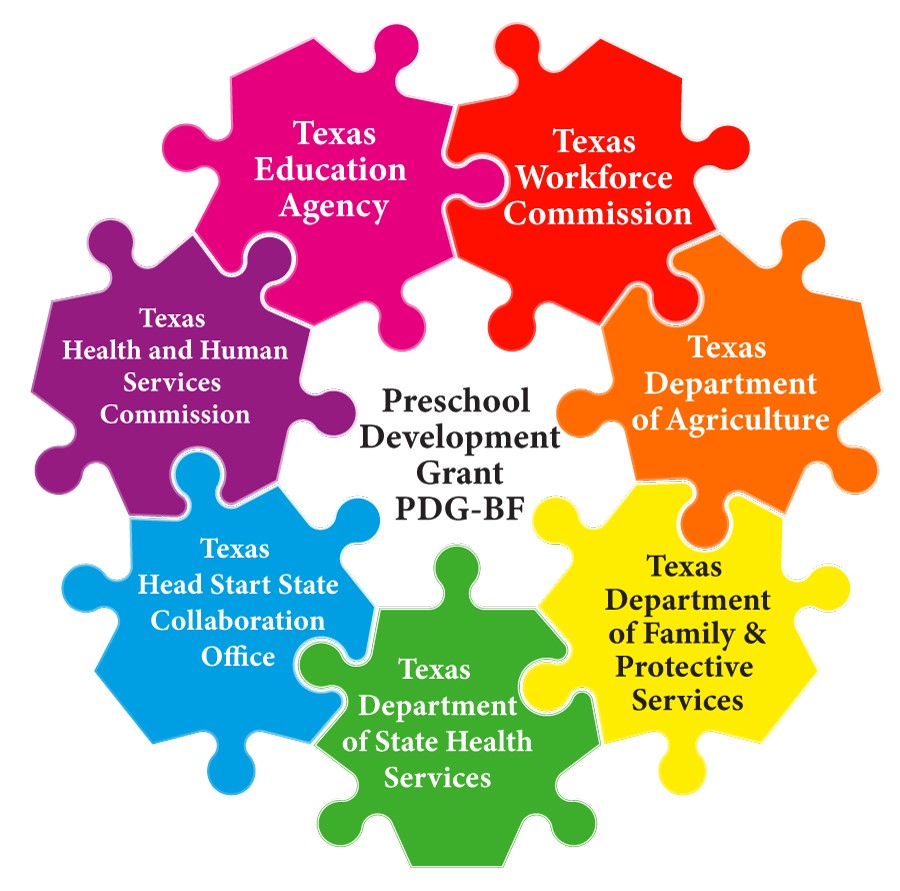Texas programming for pre-school kids is fragmented. Want to help? Take 15 minutes to participate in state-wide needs assessment. (By April 5!)
By Julie Talbert
By now, most of us know something about the remarkable rate of brain development that occurs from birth to age five. Development during this period has a lasting impact on a child’s success in school and life. Not only are there lifelong benefits for young children who participate in high quality early learning programs, but all of us benefit from a more capable and productive workforce.
Even though we know that there are significant benefits to high quality early childhood programs, our current system is fragmented and is failing children, parents and businesses. It is also limiting our potential as a state.
Parts of the Texas early learning and care system can be found in seven different state agencies and include programs like Child Care Services, child care licensing, Head Start, Prekindergarten, home visiting programs, services for children with disabilities and others. It probably wouldn’t surprise you to learn that these programs frequently have different goals, eligibility criteria, and standards, which makes coordination difficult and creates a maze for parents to navigate.
The good news is that Texas recently received a federal Preschool Development Grant Birth – Five (PDG B-5) that provides Texas with a historic opportunity to design and implement an early care and education system that gives equitable access to high-quality programs for all children and families. The award amount is $1,789,455 and when added to the required state matching funds, the project totals $2,236,292.
Below are the seven state agencies involved with PDG B-5 and are tasked with coordinating their services, streamlining their infrastructure, and improving the quality and availability of early care and education services.

To demonstrate the need to coordinate services, consider the current child care crisis that is impacting parents, children, child care providers, and businesses. Parents are struggling to find and pay for child care and many have concerns about the quality and safety of available programs.
Child care teachers are struggling to provide for their own families while their wages remain near the bottom of all occupations. Not surprisingly, more than half of child care workers qualify for some kind of public assistance. If you want to know more about that, I recommend The Early Childhood Workforce Index of 2018 http://cscce.berkeley.edu/files/2018/06/Early-Childhood-Workforce-Index-2018.pdf . Keep in mind that child care teachers are doing a job that we all agree is important and that working parents and businesses consider essential. Businesses lose billions a year in productivity due to the child care problems of their workforce.
Even though Pre-K, Head Start, and child care share similar goals around early care, education and family support, their delivery system doesn’t always meet the needs of today’s families. The child of a busy single parent may be unable to attend a Head Start or PreK program down the street because the family doesn’t qualify. This can be true even when space is available. Similarly, after attending a Pre-K program, a 3 or 4-year-old may have to ride a bus to a child care center because the parents work until 5. I understand that this arrangement works for the program, but what’s best for children and families?
If you agree that we could improve our early care and education system, YOU can help by completing a survey. The PDG B-5 is intended to rally stakeholders around a common vision and goals for young children.
Governor Abbot has appointed a 20-member Texas Early Learning Council (TELC) to oversee the work and it is just beginning. The first step is to conduct a state-wide needs assessment. This is required and must be completed and analyzed before any planning can begin. If you use early childhood services, work in early childhood programs, or have some stake in the system, please complete the survey. It will take less than 20 minutes. I finished it in 10 minutes.
The survey is open from Monday, March 25, 2019 to Friday, April 5, 2019
Click here to participate in the survey.
For more information:
En Espanol
El Consejo de Aprendizaje Temprano de Tejas (Texas Early Learning Council) está llevando a cabo una encuesta en todo el estado para entender mejor las necesidades y los desafíos de quienes acceden, proveen y apoyan programas y servicios de la infancia temprana en Tejas.
La encuesta está abierta desde EL LUNES 25 DE MARZO HASTA EL VIERNES 5 DE ABRIL DE 2019 y no debe tardar más de 20 minutos en completarse. Las preguntas dirigidas a las familias y a los proveedores de servicios y programas de la infancia temprana están disponibles en inglés y español. Si recibe el enlace a la encuesta más de una vez, por favor completa la encuesta solo una vez.
¿Quién debe completar la encuesta?
Familias
Personal de programas y servicios de la infancia temprana (guardería, Head Start, programa preescolar público, ECI, etc.)
Personal de organizaciones de la infancia temprana (Afiliación de organizaciones de la infancia temprana, organizaciones de apoyo, socios de avanzar negocios, centros regionales de recursos y servicios de educación, etc.)
Organizaciones de la comunidad (negocios, proveedores de servicios de salud, gobierno local, organizaciones religiosas, etc.)
Por favor, ayúdanos a asegurar que la encuesta llegue a tantos tejanos como sea posible. PUEDE REENVIAR LA ENCUESTA A SU FAMILIA, AMIGOS, Y COLEGAS. Organizaciones están invitados a distribuir la encuesta a las listas de distribución.
https://tea.co1.qualtrics.com/jfe/form/SV_cUeyDqwqLh2u8V7

Julie Talbert is the Manager of Child Care for the Heart of Texas Workforce Development Board. If you are working or in school and have a child under the age of 12 who needs child care, visit our website to see if you are eligible to receive a child care subsidy. https://www.hotworkforce.com/ChildCare/parent_info.php
The Act Locally Waco blog publishes posts with a connection to these aspirations for Waco. If you are interested in writing for the Act Locally Waco Blog, please email [email protected] for more information.
